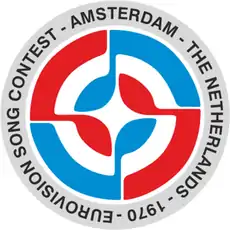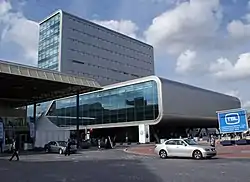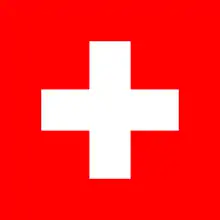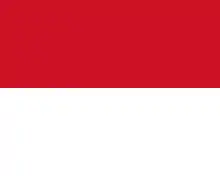Eurovision Song Contest 1970
The Eurovision Song Contest 1970 was the 15th edition of the annual Eurovision Song Contest. It took place in Amsterdam, Netherlands and was held at the RAI Congrescentrum on Saturday 21 March 1970. The show was hosted by Willy Dobbe.
| Eurovision Song Contest 1970 | |
|---|---|
 | |
| Dates | |
| Grand final | 21 March 1970 |
| Host | |
| Venue | RAI Theatre Amsterdam, Netherlands |
| Presenter(s) | Willy Dobbe |
| Musical director | Dolf van der Linden |
| Directed by | Theo Ordeman |
| Executive supervisor | Clifford Brown |
| Executive producer | Warner van Kampen |
| Host broadcaster | Nederlandse Omroep Stichting (NOS) |
| Interval act | The Don Lurio Dancers |
| Website | eurovision |
| Participants | |
| Number of entries | 12 |
| Debuting countries | None |
| Returning countries | None |
| Non-returning countries | |
Participation map
| |
| Vote | |
| Voting system | Ten-member juries distributed ten points among their favourite songs. |
| Nul points | |
| Winning song | "All Kinds of Everything" |
Due to there being four winners in the previous contest, a question was raised as to which nation would host the 1970 contest. With the UK having hosted in 1968 and Spain in 1969, only France and Netherlands were in consideration. A toss of a coin resulted in the host country being decided as the Netherlands.[1]
Twelve countries participated in the contest. It was the lowest number of participants since the 1959 edition. Finland, Norway, Portugal, Sweden and Austria did not participate in 1970 in protest of the four-way tie result of 1969.[2]
The winner was Ireland with the song "All Kinds of Everything", performed by Dana, and written/composed by Derry Lindsay and Jackie Smith. This was Ireland's first victory in the contest. The United Kingdom finished in second place for the seventh time, while Germany ended up in third place - the best result for the country at the time. This was also the only time that Luxembourg received 'nul points'.[2]
Location

The Congrescentrum, venue of the 1970 contest, is a semi-permanent exhibit at the Ferdinand Bolstraat to Amsterdam and was opened on 31 October 1922. This building was replaced in 1961 by the current RAI building on Europe's Square. The current congress and event center on Europe Square, was designed by Alexander Bodon and opened on 2 February 1961.
Format
The Dutch producers were forced to pad out the show as only 12 nations decided to make the trip to Amsterdam. The result was a format which has endured almost to the present day. An extended opening sequence (filmed in Amsterdam) set the scene, while every entry was introduced by a short video 'postcard' featuring each of the participating artists, ostensibly in their own nation. However, the 'postcards' for Switzerland, Luxembourg and Monaco were all filmed on location in Paris (as was the French postcard).[2] The long introduction film (over four minutes long) was followed by what probably is one of the shortest ever introductions by any presenter. Willy Dobbe only welcomed the viewers in English, French and Dutch, finishing her introduction after only 24 seconds. On screen captions introduced each entry, with the song titles listed all in lower case and the names of the artist and composers/authors all in capitals.
The set design was devised by Roland de Groot; a simple design was composed of a number of curved horizontal bars and silver baubles which could be moved in a variety of different ways.
To avoid an incident like in 1969, a tie rule was created. It stated that, if two or more songs gained the same number of votes and were tied for first place, each song would have to be performed again. After which each national jury (other than the juries of the countries concerned) would have a show of hands of which they thought was the best. If the countries tied again, then they would share first place.
Participating countries
Austria (who had not taken part in 1969), Denmark, Finland, Norway, Portugal and Sweden boycotted this contest as they were not pleased with the result of 1969 and the voting structure.[2] Portugal did however host a National final, being won by Sérgio Borges.[1]
Of the participating singers, a number were already established performers. Notably, the United Kingdom sent Welsh singer and Apple recording artist Mary Hopkin, while David Alexandre Winter represented Luxembourg. The contest is also notable for the appearance of the then unknown Julio Iglesias, singing for Spain.
Voting and aftermath
_zingt%252C_Bestanddeelnr_923-3687.jpg.webp)
In the run-up to the Contest, the United Kingdom were favourites to win and also the favourite with the 50-piece orchestra. So sure of victory, the UK delegation had organised a winner's party to be thrown after the contest.[1] In the end, the only two countries in the running were the UK and Ireland, albeit the latter holding the lead throughout the voting. Ireland took the victory with 32 points, 6 points ahead of the UK, with Germany a distant third. Luxembourg failed to score any points at all - their only time ever to do so.
Ireland won the contest with "All Kinds of Everything", penned by Derry Lindsay and Jackie Smith, and sung by another unknown, Dana, an 18-year-old schoolgirl from Derry, Northern Ireland. Scottish songwriter Bill Martin, who was responsible for the winning song's publishing, has on numerous subsequent occasions claimed that he and his song writing partner Phil Coulter (the team behind both Puppet on a String and Congratulations) actually wrote the song themselves, but were prevented from using their names on the credit.[3] Coulter has never repeated the claim and there is nothing public to substantiate Martin's story and it was only made after both Lindsay and Smith had died. The song became a million-seller and the singer an international star. As the contest was held in the Netherlands this year, and the country was one of the four winners in 1969, Dana received her awards from the Dutch winner Lenny Kuhr.
Mary Hopkin scored a few more hits but downscaled her music career in 1971 after getting married. She later commented on her appearance at the Contest as humiliating and said that she hated the song she had to sing.[1] Spanish entrant Julio Iglesias went on to achieve worldwide success in the decades that followed, becoming one of the top-selling singers of all time. Dana, meanwhile, continued to score hit singles throughout the 1970s with songs such as "Fairytale" and "It's Gonna be a Cold Cold Christmas". In the 1990s she became a politician, running for the Irish presidential election in 1997 and 2011, and becoming an MEP in 1999.
Of the other performers, Stella Maessen (of Hearts of Soul), Jean Vallée, Guy Bonnet and Katja Ebstein all took part in the Eurovision Song Contest again, the latter twice more. The following year, Austria, Finland, Norway, Portugal and Sweden all returned to the contest.
Conductors
Each performance had a conductor who led the orchestral accompaniment.[4][1]
 Netherlands – Dolf van der Linden
Netherlands – Dolf van der Linden Switzerland – Bernard Gérard
Switzerland – Bernard Gérard Italy – Mario Capuano
Italy – Mario Capuano.svg.png.webp) Yugoslavia – Mojmir Sepe
Yugoslavia – Mojmir Sepe.svg.png.webp) Belgium – Jack Say
Belgium – Jack Say France – Franck Pourcel
France – Franck Pourcel United Kingdom – Johnny Arthey
United Kingdom – Johnny Arthey Luxembourg – Raymond Lefèvre
Luxembourg – Raymond Lefèvre.svg.png.webp) Spain – Augusto Algueró
Spain – Augusto Algueró Monaco – Jimmy Walter
Monaco – Jimmy Walter Germany – Christian Bruhn
Germany – Christian Bruhn Ireland – Dolf van der Linden
Ireland – Dolf van der Linden
Returning artists
For the first time, no artists from previous contests returned.[5]
Results
| Draw | Country | Artist | Song | Language[6][7] | Place | Points |
|---|---|---|---|---|---|---|
| 01 | Hearts of Soul | "Waterman" | Dutch | 7 | 7 | |
| 02 | Henri Dès | "Retour" | French | 4 | 8 | |
| 03 | Gianni Morandi | "Occhi di ragazza" | Italian | 8 | 5 | |
| 04 | Eva Sršen | "Pridi, dala ti bom cvet" | Slovene | 11 | 4 | |
| 05 | Jean Vallée | "Viens l'oublier" | French | 8 | 5 | |
| 06 | Guy Bonnet | "Marie-Blanche" | French | 4 | 8 | |
| 07 | Mary Hopkin | "Knock, Knock Who's There?" | English | 2 | 26 | |
| 08 | David Alexandre Winter | "Je suis tombé du ciel" | French | 12 | 0 | |
| 09 | Julio Iglesias | "Gwendolyne" | Spanish | 4 | 8 | |
| 10 | Dominique Dussault | "Marlène" | French | 8 | 5 | |
| 11 | Katja Ebstein | "Wunder gibt es immer wieder" | German | 3 | 12 | |
| 12 | Dana | "All Kinds of Everything" | English | 1 | 32 |
Scoreboard
| Results | |||||||||||||||
|---|---|---|---|---|---|---|---|---|---|---|---|---|---|---|---|
| Netherlands | 7 | 3 | 3 | 1 | |||||||||||
| Switzerland | 8 | 2 | 2 | 1 | 2 | 1 | |||||||||
| Italy | 5 | 1 | 2 | 2 | |||||||||||
| Yugoslavia | 4 | 4 | |||||||||||||
| Belgium | 5 | 3 | 1 | 1 | |||||||||||
| France | 8 | 1 | 2 | 2 | 3 | ||||||||||
| United Kingdom | 26 | 3 | 2 | 2 | 4 | 2 | 2 | 4 | 4 | 3 | |||||
| Luxembourg | 0 | ||||||||||||||
| Spain | 8 | 3 | 2 | 3 | |||||||||||
| Monaco | 5 | 1 | 1 | 2 | 1 | ||||||||||
| Germany | 12 | 1 | 1 | 3 | 4 | 1 | 2 | ||||||||
| Ireland | 32 | 5 | 6 | 9 | 1 | 4 | 2 | 3 | 2 | ||||||
4 points
Below is a summary of all 4 points in the final:
| N. | Contestant | Voting nation |
|---|---|---|
| 4 | Ireland | Netherlands1, Switzerland2, Belgium3, United Kingdom |
| 3 | United Kingdom | Yugoslavia, Monaco, Germany |
| 1 | Germany | Spain |
| Yugoslavia | United Kingdom |
Broadcasters, commentators and spokespersons
Spokespersons
Listed below is the order in which votes were cast during the 1970 contest along with the spokesperson who was responsible for announcing the votes for their respective country.[8]
 Netherlands – Flip van der Schalie
Netherlands – Flip van der Schalie Switzerland – Alexandre Burger
Switzerland – Alexandre Burger Italy – Enzo Tortora
Italy – Enzo Tortora.svg.png.webp) Yugoslavia – Dragana Marković
Yugoslavia – Dragana Marković.svg.png.webp) Belgium – André Hagon
Belgium – André Hagon France – TBC
France – TBC United Kingdom – Colin Ward-Lewis[1]
United Kingdom – Colin Ward-Lewis[1] Luxembourg – TBC
Luxembourg – TBC.svg.png.webp) Spain – Ramón Rivera
Spain – Ramón Rivera Monaco – TBC
Monaco – TBC Germany – Hans-Otto Grünefeldt
Germany – Hans-Otto Grünefeldt Ireland – John Skehan
Ireland – John Skehan
Broadcasters and commentators
Each national broadcaster also sent a commentator to the contest, in order to provide coverage of the contest in their own native language.
| Country | Broadcaster(s) | Commentator(s) | Ref(s) | |
|---|---|---|---|---|
| Participating countries | ||||
| RTB | French: Claude Delacroix | [9] | ||
| BRT | Dutch: Herman Verelst | [8] | ||
| RTB La Première | French: TBC | |||
| BRT Radio 1 | Dutch: Nand Baert | |||
| Deuxième Chaîne ORTF | Pierre Tchernia | [8][9] | ||
| Deutsches Fernsehen | Marie-Louise Steinbauer | [8] | ||
| Deutschlandfunk/Bayern 2 | Wolf Mittler | |||
| RTÉ | Valerie McGovern | |||
| RTÉ Radio | Kevin Roche | |||
| Secondo Programma | Renato Tagliani | |||
| Télé-Luxembourg | Jacques Navadic | [8][9] | ||
| RTL | Camillo Felgen | |||
| Télé Monte Carlo | Pierre Tchernia | |||
| Nederland 1 | Pim Jacobs | [8][10] | ||
| Primera Cadena | José Luis Uribarri | [8] | ||
| Primer Programa RNE | Miguel de los Santos | |||
| TV DRS | German: Theodor Haller | |||
| TSR | French: Georges Hardy | |||
| TSI | Italian: Giovanni Bertini | |||
| BBC1 | David Gell | [8][1] | ||
| BBC Radio 1 and BBC Radio 2 | Tony Brandon | [1] | ||
| BFBS Radio | John Russell | [1] | ||
| Televizija Beograd | Serbo-Croatian: Milovan Ilić | |||
| Televizija Zagreb | Serbo-Croatian: Oliver Mlakar | |||
| Televizija Ljubljana | Slovene: Tomaž Terček | |||
| Non-participating countries | ||||
| FS1 | Ernst Grissemann | [8] | ||
| TV Tupi | Unknown | [1] | ||
| Televisión Nacional de Chile | Raúl Matas | [1] | ||
| ČST | Unknown | [1] | ||
| EIRT | Unknown | [1] | ||
| RTV | Unknown | [1] | ||
| Sjónvarpið | Unknown | [1] | ||
| Israeli Television | Unknown | [1] | ||
| NRK | No commentator | |||
| TVP | No commentator | [1] | ||
| I Programa | Henrique Mendes | [8] | ||
| TVR | Unknown | [1] | ||
| RTT | Unknown | [1] | ||
References
- Roxburgh, Gordon (2014). Songs for Europe: The United Kingdom at the Eurovision Song Contest. Volume Two: The 1970s. Prestatyn: Telos Publishing. pp. 25–37. ISBN 978-1-84583-093-9.
- O'Connor, John Kennedy. The Eurovision Song Contest - The Official History. Carlton Books, UK. 2007 ISBN 978-1-84442-994-3
- Martin, Bill. Congratulations: Songwriter to the Stars. Dujio Publishing (1 Aug. 2017) ISBN 978-1527212817
- "And the conductor is..." Retrieved 10 July 2018.
- "Eurovision Song Contest 1970". EBU. Retrieved 16 June 2012.
- "Eurovision Song Contest 1970". The Diggiloo Thrush. Retrieved 4 March 2012.
- "Eurovision Song Contest 1970". 4Lyrics.eu. Retrieved 16 September 2020.
- "Eurovision 1970 - Cast and Crew". IMDb. Retrieved 24 July 2020.
- Christian Masson. "1970 - Amsterdam". Songcontest.free.fr. Retrieved 10 August 2012.
- "Nederlandse televisiecommentatoren bij het Eurovisie Songfestival". Eurovision Artists (in Dutch).
